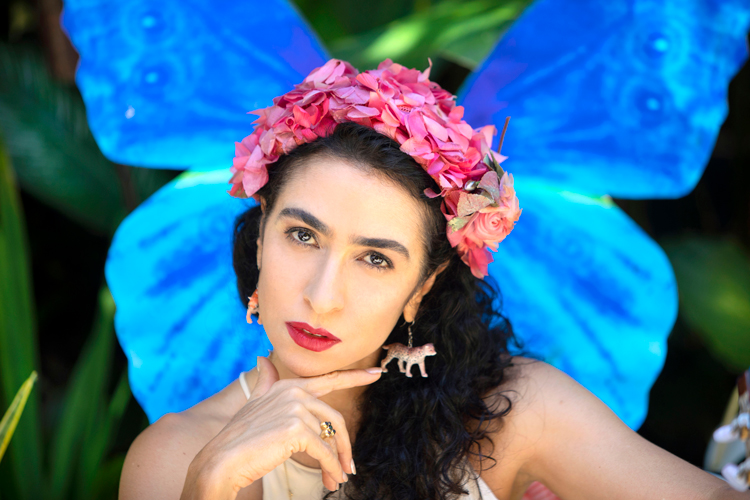Marisa Monte, singer, composer, lyricist and guitarist; is the latest in a great tradition of Brazilian divas, Marisa is at once a youthful and timeless, traditional and cosmopolitan. Brazil’s best-selling female artist has reached a pinnacle of achievement by creating songs that are heavy on rock rhythms, catchy melodies and occasional tinges of jazz and bossa nova.
A native of Rio de Janeiro, Marisa de Azevedo Monte was born July 1, 1967. She grew up in the post bossa nova era of Brazilian music dominated by the less jazzy, more pop and ballad-oriented genre known as Musica Popular Brasileira, or MPB. Stylistically broad and influenced by such global styles of the day as rock, R&B and funk, MPB would become as much a part of Brazil’s cultural heritage as the choro, samba and bossa that preceded it.
Her father, Carlos Monte, was one of the directors of the Portela Samba school, and she began her musical studies, including piano, drums & music theory, at a very early age.
At the age of 14, when she first began to dream of a career in music, Marisa Monte aspired to follow in the footsteps of an early idol, opera diva Maria Callas. While she had nurtured an interest in such legendary Brazilian vocalists as Joao Gilberto, Caetano Vetoso, Nara Leao and Maria Bethania and had already begun to explore the artistry of such American jazz singers as Ella Fitzgerald, Sarah Vaughan and Billie Holiday, her obsession with arias initially won out.
At the age of 18, she was off on a self-financed trip to Italy to study classical singing. It was while abroad, able to view for the first time the cultural riches of her homeland from afar, that the young singer changed her artistic focus and set her sights on joining the MPB ranks.

Although superficially influenced by such storied Brazilian vocalists as the late Elis Regina and Gal Costa, with whom she particularity shares some striking stylistic similarities, Monte clearly boasts her own well defined, highly individual imprint her self-titled debut album, Marisa Monte, in 1989 was an instant hit in Brazil, where rating the constant tide of budding female vocalists has created a new class of discerning music connoisseurs.
Winningly interpreting everything from Gershwin and Kurt Weill to Brazilian pop, R&B and an old Carmen Miranda tune quickly convinced her fickle countrymen that a new star worthy of the legacy of Regina, Leao and Costa had finally arrived. Monte’s eclectic tastes and penchant for lean, edgy accompaniment and judiciously employed ethnic elements from the vast Brazilian music storehouse caught the ear of North American musicians and critics.
One of her biggest fans, New York City-based guitarist Arto Lindsay, took on a mentor’s role, helping craft a string of critically acclaimed international releases. Mais (1991), Rose And Charcoal (1994), A Great Noise (1996), and Memories, Chronicles and Declarations of Love (2000), as well as Tribalistas (2003), her successful collaboration with Carlinhos Brown and Arnaldo Antunes have introduced Monte to a growing global audience.
In November 2020, when COVID restrictions began to ease, she started recording with her musicians in the studio, using full safety precautions. Musicians from New York, Spain, and Portugal made guest contributions through Zoom. Videos were shot for all the songs—“small musical documentaries that show the process of recording,” said Monte, “but also the garden, the sea, the sky, everything that was outside during the confinement, when we all had very limited physical space in which to live.”
On October 22, 2021, Monte was in Sanremo, Italy to collect the prestigious Premio Tenco award for lifetime achievement in songwriting. Monte is her country’s first female honoree. “I’m glad to represent all my Brazilian sisters,” she said, “and to be opening doors for them outside Brazil. Female singers before my generation didn’t compose as much as now; it’s an interesting change in the way women occupy space on the musical scenery in Brazil, and it reflects our presence in society as well.”
Marisa’s 2021 album, Portas, sprang out of the seemingly barren confinement imposed by the pandemic. While staying at home in Rio with her husband, son, and daughter, Monte planned Portas, an album filled with soft, comforting sounds and messages of hope. “I wanted to offer something that could heal and help people to cross this moment, to not be that depressed and sad,” she said. Of the sensual title track, Monte explains: “Doors are very symbolic elements; they talk about opportunities, changes, transformations, so I wanted to offer a sense of passage.”
Frequent tours to the U.S. and other countries have bolstered her reputation as one of the most electrifying artists to emerge from Latin America.
Discography:
Marisa Monte (EMI, 1991)
Verde, anil, amarelo, cor de rosa e carvão (EMI, 1994)
Barulhinho Bom (EMI, 1996)
Memórias, Crônicas, e Declaracões de Amor (EMI, 2000)
Tribalistas, with Carlinhos Brown and Arnaldo Antunes (EMI, 2002)
Infinito Particular (EMI, 2006)
Universo ao Meu Redor (EMI, 2006)
O Que Você Quer Saber de Verdade (EMI, 2011)
Verdade Uma Ilusao (2014)
Tribalistas, with Carlinhos Brown and Arnaldo Antunes (Universal Music, 2017)
Portas (Phonomotor/Sony, 2021)


